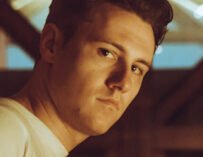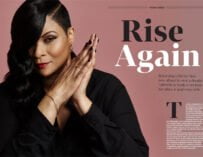
Will Sheff: “My life got shuffled around and I suddenly wasn’t at home anymore.” Pic: Fionn Reilly
The driving force behind Okkervil River talks about the band’s new album and the shift in writing which led there
Many musicians have joined, left and (in some cases) re-joined Okkervil River since they formed in Austin, Texas in 1998. During that time there has been only one constant, the group’s leader, frontman and chief songwriter Will Sheff, a perpetual presence to steer his band through their various guises and plot their musical path. The forthcoming release of new album Away will be their ninth, not counting split albums, cover albums and True Love Cast Out All Evil, on which they backed (and Sheff produced) the legendary psychedelic pioneer Roky Erickson.
Sheff’s songwriting has constantly evolved. Okkervil River’s early literate alt-folk culminated in the masterful Black Sheep Boy, which was followed by the mid-00s duo of The Stage Names and The Stand Ins which presented a meta critique on life in an intelligent indie band. 2013’s celebratory The Silver Gymnasium highlighted another shift in Okkervil River’s output and this appears to have continued on After, as witnessed on the track Okkervil River R.I.P, a stream of consciousness elegy to his own musical heritage.
Speaking to Sheff as he escaped city life in Upstate New York, we were keen to talk about how the new record came together…
Reading the promotional material, it sounds like you were almost been in two minds about releasing this new work?
“It didn’t start as a concerted attempt to make an Okkervil River record, or even a record at all. I had an album in mind that I wanted to make for a really long time and I knew that it wasn’t possible in the current configuration of Okkervil River. At that time I also didn’t know what the future of that configuration was. People were drifting away into life and I was drifting away from them. So much about the equation and the arithmetic of how to make a record and how to be Okkervil River didn’t really make sense anymore.
“Cully Symington, a drummer who used to be in Okkervil River but had quit, contacted me and said ‘hey I’m gonna be in New York for three weeks, we should do some recording.’ I didn’t have any money so we decided to do some stupid stuff in my little basement rehearsal space. Right around that time my life got shuffled around and I suddenly wasn’t at home anymore and I was staying at my friend’s place in the woods Upstate and I started writing.”
How did it progress from there?
“The first song I wrote for the record was She Would Look For Me and then the next day I wrote Okkervil River R.I.P. At that point I thought this is not just fucking-around-in-a-basement material, this is that record I’ve wanted to write. I knew that when you have a drummer like Cully, you can do anything. He is so good that you don’t have to put limits on yourself in terms of what kind of record you can make and that we could do something cool with it.
“I was financially strapped and wouldn’t have a lot of time to perfect it in the studio so I needed to get the very best musicians that I could find, who could bash it out in one or two takes. I started slowly assembling people to play with me and Cully. I got this bassist named Noah Garabedian who comes from a jazz background. I wanted people who had dedicated their life to learning music. There’s this band called Star Rover that I was really into and the guitarist’s name is Will Grace. They play a lot of American old-time music that is filtered through a free jazz approach. To me that Delta blues/hillbilly/ragtime music from the 20s and 30s is the periodic table of songwriting and a lot of those songs have roots that go back hundreds and hundreds of years. Will has a real understanding of that material and can perform it with a lot of heart and soul and an authentic spirit but he also brings something new and vibrant to it.”

Okkervil River. Will Sheff: “I started to hate how I could be clever and how I could impress people.”
And you play guitar, and sing of course?
“I found a twelve-string acoustic guitar at a consignment shop back in my home town. Nobody wanted to buy it so they kept marking it down. It previously belonged to this old guy who lived in town and it was his favourite guitar. I thought ‘I’m going to buy this guitar and I’m going to write a record on it.’
“For ever people had given me shit about my voice and they still do. They say that I’m out of tune and for a while it was a torment to me. I just thought my singing wasn’t good enough and spent a lot of time doing a lot of performances and cropping them all together, trying to do something that sounded least offensive to people’s sensibilities. For this record I decided that I’m done with that, so I sang the songs live and we played everything live. I wrote about fifteen songs and we recorded them all in two days but I had more to say so I did some more writing. We went back in the studio and did another five songs. From all that material I took the nine songs that sounded like they belonged together and that’s how I made Away.”
How does one of those songs tend to be born?
“I’ve been through many different phases in my songwriting career. I don’t really remember how I used to do it. I think I used to be so afraid, running through a field with my eyes closed. At a certain point people started to tell me that I was good at songwriting but at the same time I wasn’t making any money and I was still having such a struggle, so I started to try to demonstrate how I was good at writing and I tried to make the songs more and more overtly smart. I guess a bad word for that would be ‘clever’ and at a certain point I just started to hate those songs. I started to hate how I could be clever and how I could impress people.”
Was that during a specific point in your career?
“Right around The Stand Ins. I love some of those songs but there’s a couple that I can’t stand because I feel like you can hear a precocious kid trying to show off his brain. I don’t even like brain music. There are certain artists who are known for being incredibly complex, wordy and intelligent in their work and I don’t care about that. I’m more of an intuitive person. Working with Roky Erickson really set me free because I saw how Roky was connected to some kind of other world through his intuition, creativity and spirit. He was able to tap into that world and take things from it and into our world. What he does is that hair standing up on your arm thing and to me that’s the height of music.
“I started feeling like I didn’t want to know what my songs were about and I didn’t want to be coercing anyone into thinking anything. I Am Very Far was a big watershed record for me because it was the first expression of that effort. At the same time it a baby step into that world and I didn’t really understand how to integrate it. In a lot of ways I needed to get older and I needed to experience a little more pain and to experience a little more failure and to bring a little more discipline into my principles.”
And that has continued with your writing for Away?
“These days when I write I try to channel something and I don’t try to know what’s it about and I don’t try to convince anybody of anything and I don’t try to walk into a song knowing what I’m going to say. I just try to be fully open and in the moment. Like I’m sitting there with a Ouija board.”
Does getting high help to open yourself up?
“Sometimes, that’s a good way. I meditate a lot and try to take mushrooms fairly often, just because it’s a way to connect to some other dimension. I think that marijuana is a really great creative tool. I first learned that from Brian Beattie. He would work on the mix and then be like ‘now let’s have some pot to see how it sounds.’ It’s like getting on a catapult which shoots you over to the other side of the work so you see it from a totally different angle. All of a sudden you might forgive a lot of the things that you thought were bad and see that a lot of the things you thought were good were just expressions of vanity. If you ever find yourself trying to impress anybody you should be careful because that moment will probably be something that will embarrass you later.”

Okkervil River. Will: “I think that psychedelics are a really great tool”
So the drugs help remove that vanity?
“I think that psychedelics are a really great tool and I really think that they’re here for a reason but I also think that a lot of my life these days I just try to identify the part of me that has always been me. The more I look back on my life, the more I realise that there’s some part of me that’s always been the same and that’s the most special part of me. Everybody has something inside of them that’s the most special part and as you get older the world tries to suppress it. What I try really hard to do in my life and in my work is to constantly make a safe space for that person and try to write from there and feel from there and interact with people from there. The other thing is to try to be really real and I think that for a while I had forgotten that.”
Could your previous work as a critic be partly to blame for that?
“I did find for a while that I had to stop criticism as I was looking at my own work too critically but I think I’m somehow able to keep those things separated. I think that what saved me as a critic is that I always come to criticism from an enthusiastic standpoint. If I love something it’s easy to talk about why I love it and if I hate something it’s usually because I’m offended by its softness. Art is so important that it pisses me off when somebody is bullshitting me and so somehow that doesn’t feel like snark or cynicism.”
Are you a big reader?
“I grew up with my nose in several books at once and read a lot. I have to admit that the internet and my telephone have completely disrupted my reading. I still do read often but I think that these devices that are in our pockets they’re like a drug and that’s something people need to fight against. They’ve disrupted my ability to tear through a bunch of novels in a short period of time, which is what I used to do. I still read but then I get side-lined by five million articles about why Donald Trump sucks. I’m reading them and it’s making me feel better and then I think ‘I already know Donald Trump sucks, why do I need to hear it said in fifty different ways?’
Now that it’s finished, does Away feel like an Okkervil River album?
“The funniest thing is that Okkervil River has been a band for almost twenty years. You probably have your favourite Okkervil River period and somebody else has their favourite period. There might be somebody who loves The Stage Names and they remember that version of the band and there might be somebody who loves The Silver Gymnasium and there might be somebody who is just into the super-early stuff.
“Over the years we’ve had so many different members and they all have their memories of when they were in Okkervil River and what the band was at that time. The funny thing, and it’s a lonely and a sweet thing too, is that because I’m the original member I’m the only one who remembers all the different ways there’ve been. I’m alone in remembering every single individual person and what they were in the band throughout the years that we’ve been around. So Okkervil River has been a million different things and my feeling about what it is right now is that it’s how I remember the music feeling right when I was starting out. I think that in that way, it’s the most Okkervil River. It feels to me like when I was living with my best friend in a house in Austin, Texas in 1998 and we were not thinking about anything, we were just free.”
Fans are always concerned that artists will become jaded after such a long time in the music industry, is that something you’ve experienced?
“Well it happens and you know it’s totally understandable. It has happened to me even though I didn’t know it was happening at the time. I feel like I lost my way but not in the sense that I wasn’t always making good work. On the whole I’m proud of everything that I’ve done but I just wasn’t as connected as I could be and I didn’t realise it. I wasn’t phoning it in, I wasn’t going ‘fuck the audience, fuck everything, just give me some money everybody sucks,’ you know I wasn’t going like that. Some people I know are just like ‘fuck music, I hate music, I don’t listen to music any more I hate it and I’m just doing records because people keep buying them,’ I’ve heard people say that.”

Okkervil River. Sheff: “It’s about discipline and trying to connect yourself with that primary oneness of the world”
How do you see your role as an artist?
“For me as an artist I feel like the fundamental job that I have right now is to make work that is so beautiful that is has the power to help people. It could be in a little way, in the way music can help you by cheering you up, and it could be in really deep ways like helping you in your darkest hour. And it also could be giving you the desire to try to take your life in a different direction.”
Is that any reflection of the current state of the world?
“I think that there’s been a successful effort on the part of business and government to fragment us and distract us and to spread cynicism and that’s what I think about phones and the internet. So much of it is beautiful and connecting but so much of it deadening and dulling and I think that people are really afraid to just be present and this stuff helps us put off being present and that’s what drives me nuts. When I was a child I had so much magic coursing through my whole system, some kind of glow to things and I feel like it’s still there, that glow and that magic. We still live in the same world but you can’t just take a shortcut to it. As much as I talked about psychedelic drugs I think the real proper place for them is within a larger spiritual discipline, it’s not spring break. It’s about discipline and trying to connect yourself with that primary oneness of the world.”
Can that be seen in your writing at all?
“I felt this hunger for something deeper than what I was experiencing. I felt like my life was just wasted time and The Silver Gymnasium was a reflection of that. I was feeling this nostalgia and a lot of the times I write a record to exorcise some kind of demon and I think I wrote that record to exorcise that demon of nostalgia. I knew that nostalgia was bullshit and a lie but it was tormenting me and usually these things work and it did, I don’t feel nostalgic the way that I used to. I actually cured it with The Silver Gymnasium and Down Down The Deep River and at that point I realised that this nostalgia was a manifestation of how unhappy I was with the present, that I had fetishised the past because I was so miserable in the present. I think that when you look at the culture right now and how they’re remaking everything from the 70s and 80s as if they’re sacred texts it shows we’re not happy in the present.”
Are you confident about the future of Okkervil River?
“Who knows, I might never do another Okkervil River record again or I might do twenty more, I don’t know. But I do want to make art for as long as I can. I’d like to be making art on the day that I die. I think of it as my job but it’s even more than that, it’s like a religion almost. The fact that I’ve been able, through some sheer coincidence, to actually be able to do it for this long while so many talented people have not been able to, it would disrespectful for me not to feel the most passionate I can about art and for me to not work at it constantly. I think it’s disrespectful of me to not throw everything I have at this always.”
Interview: Duncan Haskell
Away by Okkervil River is released 9 September via ATO Records. More info can be found here http://www.okkervilriver.com/



































Related Articles